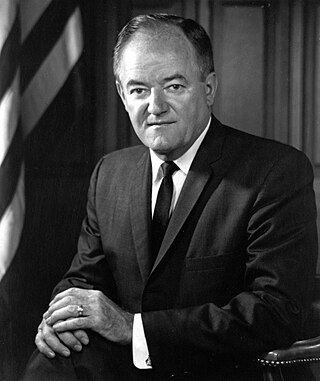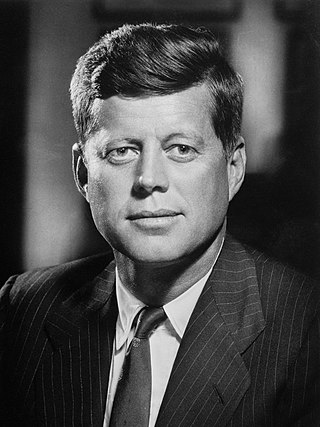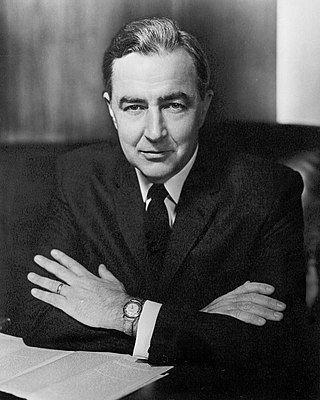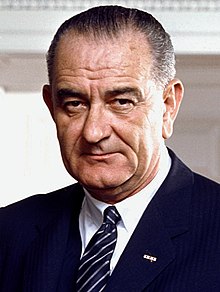
Presidential elections were held in the United States on November 3, 1964, less than a year following the assassination of John F. Kennedy, who won the previous presidential election. Incumbent Democratic President Lyndon B. Johnson defeated Republican Senator Barry Goldwater in a landslide victory. Johnson was the fourth and most recent vice president to succeed the presidency following the death of his predecessor and win a full term in his own right. Johnson won the largest share of the popular vote for the Democratic Party in history at 61.1%. As of 2024, this remains the highest popular vote percentage of any candidate since the advent of widespread popular elections in 1824.

Presidential elections were held in the United States on November 5, 1968. Republican nominee, former vice president Richard Nixon, defeated both the Democratic nominee, incumbent vice president Hubert Humphrey, and the American Independent Party nominee, former Alabama governor George Wallace.

Hubert Horatio Humphrey Jr. was an American politician and statesman who served as the 38th vice president of the United States from 1965 to 1969. He twice served in the United States Senate, representing Minnesota from 1949 to 1964 and again from 1971 to 1978. As a senator he was a major leader of modern liberalism in the United States. As President Lyndon B. Johnson's vice president, he supported the controversial Vietnam War. An intensely divided Democratic Party nominated him in the 1968 presidential election, which he lost to Republican nominee Richard Nixon.

Lyndon Baines Johnson, also known as LBJ, was the 36th president of the United States, serving from 1963 to 1969. He became president after the assassination of John F. Kennedy, under whom he had served as the 37th vice president from 1961 to 1963. A Democrat from Texas, Johnson previously served as a U.S. representative and U.S. senator.

Eugene Joseph McCarthy was an American politician, writer, and academic from Minnesota. He served in the United States House of Representatives from 1949 to 1959 and the United States Senate from 1959 to 1971. McCarthy sought the Democratic presidential nomination in the 1968 election, challenging incumbent Lyndon B. Johnson on an anti-Vietnam War platform. McCarthy unsuccessfully ran for U.S. president four more times.

Allard Kenneth Lowenstein was an American Democratic politician who served as the U.S. representative for the 5th congressional district in Nassau County, New York, for one term from 1969 to 1971.

The 1964 United States Senate elections were held on November 3. The 33 seats of Class 1 were contested in regular elections. Special elections were also held to fill vacancies. They coincided with the election of President Lyndon B. Johnson by an overwhelming majority, to a full term. His Democratic Party picked up a net two seats from the Republicans. As of 2023, this was the last time either party has had a two-thirds majority in the Senate, which allowed the Senate Democrats to override a veto, propose constitutional amendments, or convict and expel certain officials without any votes from Senate Republicans. However, internal divisions would have prevented the Democrats from having done so. The Senate election cycle coincided with Democratic gains in the House in the same year.
The Robert F. Kennedy presidential campaign began on March 16, 1968, when Kennedy, a United States Senator from New York, mounted an unlikely challenge to incumbent Democratic United States President Lyndon B. Johnson. Following an upset in the New Hampshire primary, Johnson announced on March 31 that he would not seek re-election to a second full term. Kennedy still faced two rival candidates for the Democratic Party's presidential nomination: the leading challenger United States Senator Eugene McCarthy and Vice President Hubert Humphrey. Humphrey had entered the race after Johnson's withdrawal, but Kennedy and McCarthy remained the main challengers to the policies of the Johnson administration. During the spring of 1968, Kennedy led a leading campaign in presidential primary elections throughout the United States. Kennedy's campaign was especially active in Indiana, Nebraska, Oregon, South Dakota, California, and Washington, D.C. After declaring victory in the California primary on June 4, 1968, Kennedy was assassinated at the Ambassador Hotel in Los Angeles. He died on June 6, 1968 at Good Samaritan Hospital. Had Kennedy been elected president, he would have been the first brother of a former U.S. president to win the presidency himself.

Lyndon B. Johnson's tenure as the 36th president of the United States began on November 22, 1963, upon the assassination of President John F. Kennedy, and ended on January 20, 1969. He had been vice president for 1,036 days when he succeeded to the presidency. Johnson, a Democrat from Texas, ran for and won a full four-year term in the 1964 presidential election, in which he defeated Republican nominee Barry Goldwater in a landslide. Johnson withdrew his bid for a second full term in the 1968 presidential election because of his low popularity. Johnson was succeeded by Republican Richard Nixon, who won the aforementioned election. His presidency marked the high tide of modern liberalism in the 20th century United States.
The 1968 presidential campaign of Eugene McCarthy was launched by United States Senator Eugene McCarthy of Minnesota in the latter part of 1967 to vie for the 1968 Democratic Party nomination for president of the United States. The focus of his campaign was his support for a swift end to the Vietnam War through a withdrawal of American forces. The campaign appealed to youths who were tired of the establishment and dissatisfied with government.

From March 8 to June 7, 1960, voters and members of the Democratic Party elected delegates to the 1960 Democratic National Convention through a series of caucuses, conventions, and primaries, partly for the purpose of nominating a candidate for President of the United States in the 1960 election. The presidential primaries were inconclusive, as several of the leading contenders did not enter them, but U.S. Senator John F. Kennedy of Massachusetts emerged as the strongest candidate and won the nomination over Lyndon B. Johnson at the convention, held from July 11 to 15 at the Los Angeles Memorial Sports Arena.

From March to July 1968, Democratic Party voters elected delegates to the 1968 Democratic National Convention for the purpose of selecting the party's nominee for president in the upcoming election. Delegates, and the nominee they were to support at the convention, were selected through a series of primary elections, caucuses, and state party conventions. This was the last time that state primary elections formed a minority of the selection process, as the McGovern–Fraser Commission, which issued its recommendations in time for the 1972 Democratic Party presidential primaries, would dramatically reform the nomination process to expand the use of popular primaries rather than caucuses.

Electoral history of Ted Kennedy, United States Senator from Massachusetts (1962–2009) and, at the time of his death, the second most senior member of the Senate.

Electoral history of Eugene McCarthy, United States Senator (1959–1971) and Representative (1949–1959) from Minnesota. He was a member of the Minnesota Democratic-Farmer-Labor Party.

The 1968 presidential campaign of Hubert Humphrey began when Hubert Humphrey, the 38th and incumbent Vice President of the United States, decided to seek the Democratic Party nomination for President of the United States on April 27, 1968, after incumbent President Lyndon B. Johnson withdrew his bid for reelection to a second full term on March 31, 1968, and endorsed him as his successor. Johnson withdrew after an unexpectedly strong challenge from anti-Vietnam War presidential candidate, Senator Eugene McCarthy of Minnesota, in the early Democratic primaries. McCarthy, along with Senator Robert F. Kennedy of New York, became Humphrey's main opponents for the nomination. Their "new politics" contrasted with Humphrey's "old politics" as the increasingly unpopular Vietnam War intensified.

From March 10 to June 2, 1964, voters of the Democratic Party chose its nominee for president in the 1964 United States presidential election. Incumbent President Lyndon B. Johnson was selected as the nominee through a series of primary elections and caucuses culminating in the 1964 Democratic National Convention held from August 24 to August 27, 1964, in Atlantic City, New Jersey.
The 1964 presidential campaign of Lyndon B. Johnson was a successful campaign for Johnson and his running mate Hubert Humphrey for their election as president and vice president of the United States. They defeated Republican presidential nominee Barry Goldwater and vice presidential nominee William Miller. Johnson, a Democrat and former vice president under John F. Kennedy was inaugurated as president upon Kennedy's assassination. In 1964, Johnson did not look optimistically upon the prospect of being elected president in his own right. Despite Johnson's uncertainty about running, he was seen as the most likely candidate to get the nomination. He entered the primaries starting with New Hampshire and won the state by almost 29,000 votes. Johnson's main opponent in the primaries was Alabama Governor George Wallace, who had announced his intention to seek the presidency even before Kennedy's assassination.

The 1968 New Hampshire Democratic presidential primary was held on March 12, 1968, in New Hampshire as one of the Democratic Party's statewide nomination contests ahead of the 1968 United States presidential election.

On March 31, 1968, then-incumbent U.S. president Lyndon B. Johnson made a surprise announcement during a televised address to the nation that began around 9 p.m., declaring that he would not seek re-election for another term and was withdrawing from the 1968 United States presidential election. Johnson stated, "I shall not seek, and I will not accept, the nomination of my party for another term as your president."















